Across the world, many call themselves fishermen; you, dear WFS customer, may even use this word to describe yourself. There’s the fisherman who ties the fishing line to their big toe and falls asleep under the hot summer sun with a cooler not too far away. There’s the one who’s rod and reel live in the back of the truck, who sees opportunity in each tide switch and ripple of current. Then, of course, there’s the fisherman: The Old Man in the Sea type, The River Runs Through It type, the fishing-till-you’re-not type, the patient in a river but anxious on the bank type...the 6 weeks on a Bristol Bay gillnetter followed three weeks later by six days up a Bristol Bay river type. One might say, the Steve Kurian type.

It takes a special kind of person, and really a special kind of fisherman, to find joy in damp waders and bone-cold foggy mornings. True. More notably, however, it takes a special kind of place. For the WFS team, that place is Bristol Bay. Steve has spent the past 14 years on the commercial side of this fishery, earning a living and building a business around the delicious and nutritious sustainable resource that makes a home there: the Wild Alaska Salmon. He spent the last week of August discovering that the commercial harvest is not enough--not enough for the fishermen in him, but more importantly not enough to fulfill his appreciation for Bristol Bay.

In this recent trip, he described a new understanding of Bristol Bay’s salmon. During sixty miles on a pack raft floating the--Get This!--the Good News River, Steve discovered spawning salmon--all fives species looking almost unrecognizable from the ones he brings aboard his gillnetter out in the bay. Salmon are anadromous fish and change look and shape as they reach fresh water and prepare to spawn and then die. He described the awe of witnessing this natural phenomena from beginning to end, where a king salmon had beat its tail so hard against the river bed making its way upriver that its tail had turned white. He described the humility of watching a brown bear run from a gray wolf, speeding away at 35 miles an hour, as they can do.





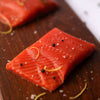 Wild Alaska Salmon
Wild Alaska Salmon Alaska Salmon Burgers
Alaska Salmon Burgers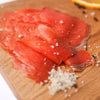 Smoked Salmon & Seafood
Smoked Salmon & Seafood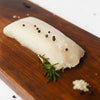 Wild Alaska Whitefish
Wild Alaska Whitefish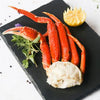 Wild Shellfish & Shrimp
Wild Shellfish & Shrimp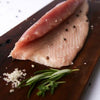 Wild Albacore Tuna
Wild Albacore Tuna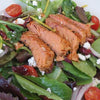 Canned Seafood
Canned Seafood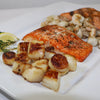 Meal Box & Samplers
Meal Box & Samplers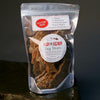 Pet Products
Pet Products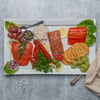 Gifts
Gifts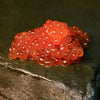 Specialty
Specialty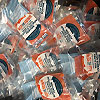 Wholesale Ordering
Wholesale Ordering